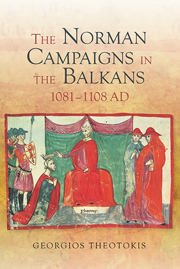Book contents
- Frontmatter
- Contents
- Acknowledgements
- List of abbreviations
- Map I Southern Italy and Sicily
- Map II The island of Sicily
- Map III The southern Balkan peninsula
- Genealogical table: The Norman dukes
- Dedications
- Introduction
- 1 Primary Sources and the Problems of Military History
- 2 Norman Military Institutions in Southern Italy in the Eleventh Century
- 3 The Byzantine Army of the Tenth and Eleventh Centuries
- 4 The Byzantine Naval Forces of the Tenth and Eleventh Centuries
- 5 The Establishment of the Normans in Southern Italy and Sicily
- 6 Robert Guiscard's Invasion of Illyria
- 7 The Norman Advances in the Balkans and the End of the Dream
- 8 Bohemond of Taranto and the First Crusade
- 9 The Count's Campaign of 1107 and the Treaty of Devol
- Conclusions
- List of Byzantine Emperors
- The Hauteville family
- Glossary
- Bibliography
- Index
2 - Norman Military Institutions in Southern Italy in the Eleventh Century
Published online by Cambridge University Press: 05 October 2014
- Frontmatter
- Contents
- Acknowledgements
- List of abbreviations
- Map I Southern Italy and Sicily
- Map II The island of Sicily
- Map III The southern Balkan peninsula
- Genealogical table: The Norman dukes
- Dedications
- Introduction
- 1 Primary Sources and the Problems of Military History
- 2 Norman Military Institutions in Southern Italy in the Eleventh Century
- 3 The Byzantine Army of the Tenth and Eleventh Centuries
- 4 The Byzantine Naval Forces of the Tenth and Eleventh Centuries
- 5 The Establishment of the Normans in Southern Italy and Sicily
- 6 Robert Guiscard's Invasion of Illyria
- 7 The Norman Advances in the Balkans and the End of the Dream
- 8 Bohemond of Taranto and the First Crusade
- 9 The Count's Campaign of 1107 and the Treaty of Devol
- Conclusions
- List of Byzantine Emperors
- The Hauteville family
- Glossary
- Bibliography
- Index
Summary
The political and social reasons behind the Norman descent upon Italy
A factor that encouraged contacts between France and Italy in the first quarter of the eleventh century was pilgrimage. Italy was the crossing point of every major pilgrimage route leading to the Holy Land, and the Normans appear as pilgrims in two of the three relatively different versions mentioning the coming of the Normans to Italy. Amatus of Monte Cassino writes of a group of forty Norman pilgrims who witnessed a Muslim attack at Salerno while returning from Jerusalem ‘before the year 1000’ who were recruited by Gaimar IV to help the defenders. On the other hand, William of Apulia and Lupus Protospatharius mention a group of Norman pilgrims who met with a Lombard noble named Melus while on pilgrimage on Monte Gargano in 1016, and promised to reinforce the latter's planned Apulian rebellion against the Byzantines. In each case, the means to purify the soul from sin through pilgrimage significantly increased the religious and social ties between Normandy and Italy since the beginning of the eleventh century. The great religious site of the sanctuary of Monte Sant' Angelo sul Gargano, dedicated to Archangel Michael, served as an important religious link between Jerusalem, Italy and Normandy.
Another contributing factor to the Norman migration to the south has been identified as the overpopulation of Normandy. A characteristic example from this period is the sons of Tancred of Hauteville, whose reasons for venturing to Italy are discussed by Amatus of Monte Cassino, Geoffrey Malaterra and Orderic Vitalis. According to Amatus, ‘these people [the Normans] had increased to such a number that the fields and orchards were not sufficient for producing the necessities of life for so many’, with Malaterra adding that ‘the sons of Tancred noticed that whenever their aging neighbours passed away, their heirs would fight amongst themselves for their inheritance, resulting in the division of the patrimony – which had been intended to fall to the lot of a single heir – into portions that were too small [. . .] Ultimately, with the guidance of God, they came to Apulia, a province of Italy’.
- Type
- Chapter
- Information
- The Norman Campaigns in the Balkans, 1081-1108 AD , pp. 31 - 57Publisher: Boydell & BrewerPrint publication year: 2014



